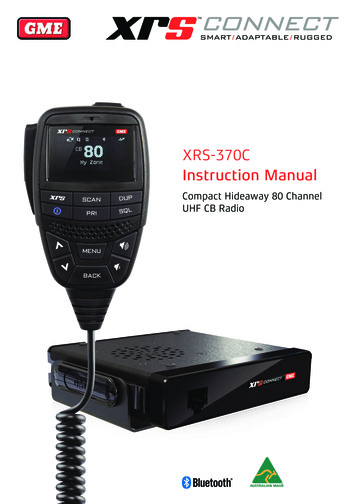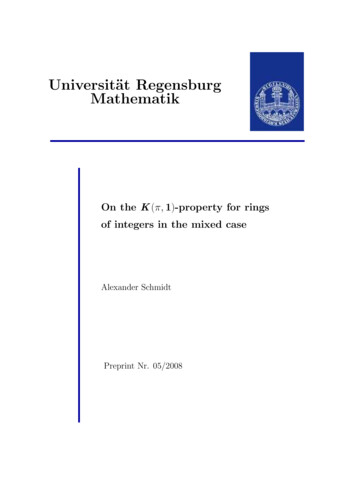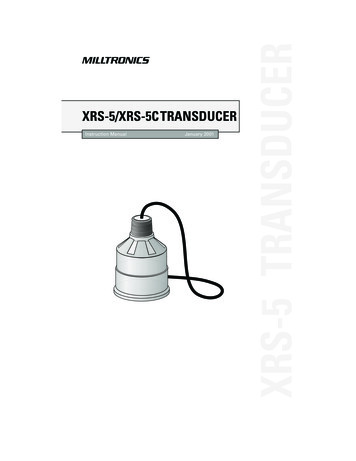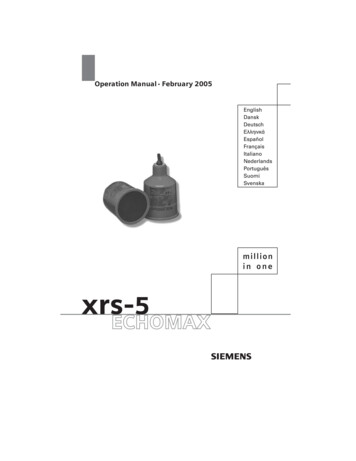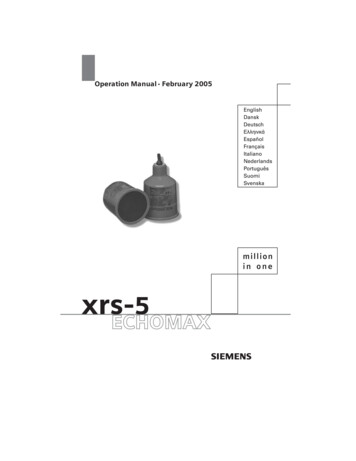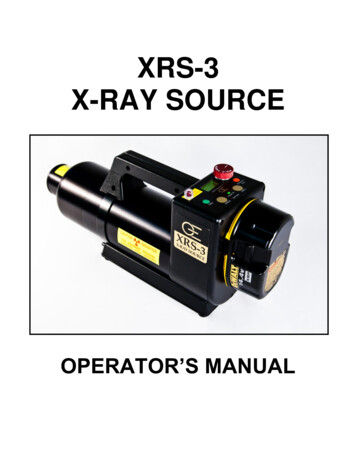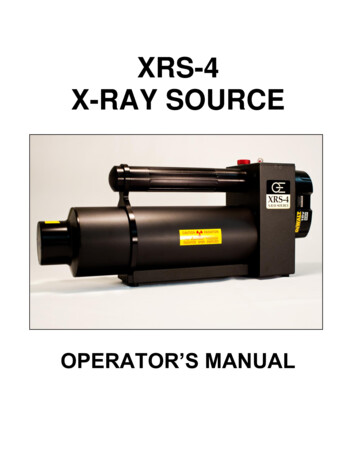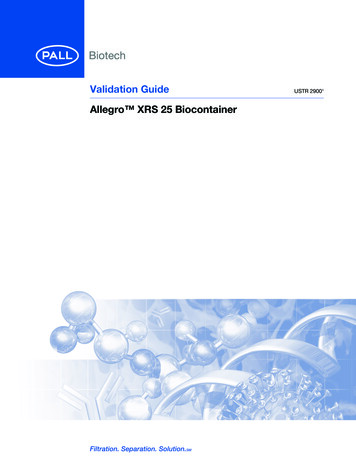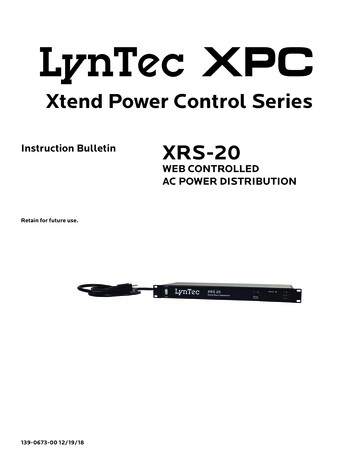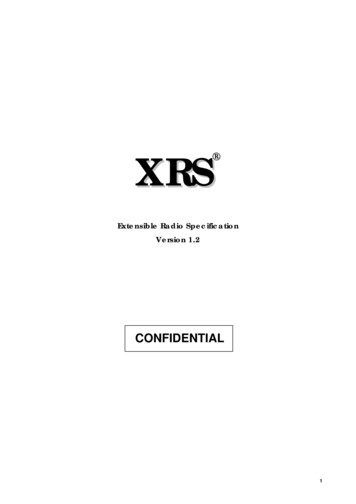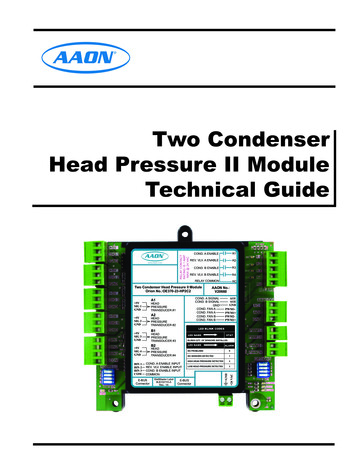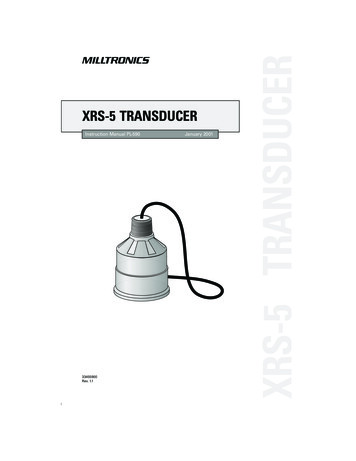
Transcription
Instruction Manual PL-59033455900Rev. 1.1January 2001XRS-5 TRANSDUCERXRS-5 TRANSDUCER
Safety GuidelinesWarning notices must be observed to ensure personal safety as well as that of others, and toprotect the product and the connected equipment. These warning notices are accompaniedby a clarification of the level of caution to be observed.Qualified PersonnelThis device/system may only be set up and operated in conjunction with this manual.Qualified personnel are only authorized to install and operate this equipment in accordancewith established safety practices and standards.Warning: This product can only function properly and safely if it is correctly transported,stored, installed, set up, operated, and maintained.Note: Always use product in accordance with specifications.Copyright Siemens Milltronics ProcessInstruments Inc. 2000. All Rights ReservedDisclaimer of LiabilityThis document is available in bound version and inelectronic version. We encourage users topurchase authorized bound manuals, or to viewelectronic versions as designed and authored bySiemens Milltronics Process Instruments Inc.Siemens Milltronics Process Instruments Inc. willnot be responsible for the contents of partial orwhole reproductions of either bound or electronicversions.While we have verified the contents ofthis manual for agreement with theinstrumentation described, variationsremain possible. Thus we cannotguarantee full agreement. Thecontents of this manual are regularlyreviewed and corrections are includedin subsequent editions. We welcomeall suggestions for improvement.Technical data subject to change.MILLTRONICS is a registered trademark of Siemens Milltronics Process Instruments Inc.Contact SMPI Technical Publications at the following address:Technical PublicationsSiemens Milltronics Process Instruments Inc.1954 Technology Drive, P.O. Box 4225Peterborough, Ontario, Canada, K9J 7B1Email: techpubs@milltronics.comFor the library of SMPI instruction manuals, visit our Web site: www.milltronics.com Siemens Milltronics Process Instruments Inc. 2001
Table of ContentsSpecifications . 5About the Transducer. 7General Guidelines . 8Installation. 9Outline and Dimensions . 9Mounting. 11Recommendations. 11Applications. 13Open Channel Meter. 13Standpipes and Stilling Wells . 14Water / Wastewater . 15Transducer Placement. 16Locations. 16Interconnection . 19Direct Connection . 19Coaxial Connection. 202-Wire Extension (for EnviroRanger ERS 500 only) . 20Maintenance . 20Installation Diagram . 21PL-590XRS-5 TransducerPage 3
Page 4XRS-5 TransducerPL-590
Specifications{{Measurement Range{{Vessel Pressure{SpecificationsProcess Application:liquids and slurries0.3 to 8m (1 to 26 ft) typical(may depend on application variables)vented to atmosphereOperation:{{{{Beam AngleFrequencyTemperature SensorSupply Source{{{{10 43 KHzinternaltransducer shall only be supplied by Milltronicscertified controllerEnvironmental:{{{{Location{Ambient temperatures {Altitude{Pollution degree{indoor / outdoor-20 to 65 C (-4 to 149 F)2000 m maximum4Construction:{{HousingMounting{{Cable:{ 12Kynar Flex body and Hypalon face1” NPT or BSP conduit connection22 wire shielded / twisted, 0.5 mm (18 AWG) PVC jacketIngress protection:{IP-683Weight :{1.2 Kg (2.6 lb)Options:{{{factory flanged to suit ANSI , DIN or JIS standardsplit flange (field mount) to suit ANSI, DIN or JIS standardsubmergence shield (flooding applications)Cabling (maximum run):{{365 m (1200 ft) using RG-62 A/U coaxial cable365 m (1200 ft) using 2-wire twisted pair / braided and foil shielded 202AWG (0.5 mm ), PVC jacket (EnviroRanger ERS 500 only)Approvals:{4CE , CSA, FM, CENELEC/ATEX, SAA, see device nameplate1 Kynar Flex is registered trade mark of ELF Atochem. Hypalon is a registered trademark of Du Pont3approximate weight of transducer with standard cable length4EMC performance available upon request2PL-590XRS-5 TransducerPage 5
SpecificationsPage 6XRS-5 TransducerPL-590
About the TransducerThe Echomax XRS-5 transducer works with Milltronics transceivers andprovides the ultrasonic pulse and echo receptionthat these devices require.The XRS-5 transducer incorporates anintegral temperature sensor that reports theambient temperature to the transceiver. Theconnection is transparent in that both theultrasonic and temperature components ofthe transducer use the same leads. Thisensures that the Milltronics transceiver canautomatically compensate the speed ofsound constant for varying temperatures.PL-590XRS-5 Transducertransducertransducerface-3dbboundaryaxis oftransmission,perpendicularto transducerfacePage 7About this The transducer converts electrical pulsesprovided by the transceiver to ultrasonic pulsesused for measurement and then converts theultrasonic echoes back to an electrical signal.This signal is interpreted by the Milltronicstranceiver using the patented SonicIntelligence algorithms. The ultrasonic pulsereduces in power by 3dB in a 10 cone from thetransducer face. It is important to keep objectsout of this cone to reduce the chance of falseechos being recorded.
General GuidelinesAbout this The equipment may be used in all hazardous zones with all gases withtemperature classes T1, T2, T3, T4, T5 and T6. The equipment is onlycertified for use in ambient temperatures in the range of -20 C to 65 C andshould not be used outside this range. Installation shall be carried out in accordance with the applicable code ofpractice by suitably trained personnel. The apparatus shall only be supplied from a circuit containing a suitablyrated fuse having a breaking capacity of 4000A. This fuse is included inMilltronics’ transceivers. Repair of this equipment shall be carried out in accordance with theapplicable code of practice. The certification of this equipment relies on the following materials used in itsconstruction: Enclosure:Kynar Flex 2800-02 (former designation 2820) /Chlorosulfonated polyethylene / Nitrile / Ethylene propylene/ ChloropreneEncapsulant:LA-9823-76Manual override can be accomplished by using the disconnect switchprovided in the building installation of the associated controller.Page 8XRS-5 TransducerPL-590
InstallationOutline and DimensionsStandardFlange (optional)127mm(5.0”)127mm(5.0”)ANSI, DIN or JISstandards89mm(3.5”)Submergence ShieldSplit Flange (optional)155mm(6.1”)ANSI, DIN or JISstandards124mm(4.9”)Refer to Milltronicsinstruction manual PL-530.PL-590XRS-5 TransducerPage 9Installation133mm(5.2”)nominal
InstallationPage 10XRS-5 TransducerPL-590
MountingRecommendations Mount the transducer so that it is above the maximum material level by morethan the blanking value to ensure that accurate results are achieved. Referto the associated transceiver manual for information on setting the blankingvalue. The transducer must be mounted so that the axis of transmission isperpendicular to the liquid’s surface. Do not over tighten mounting. Hand tightening of the mounting hardware issufficient. Consider the optional temperature sensor when mounting the transducer.Suspended ConduitBracketflexible conduitrigid metalconduitsteel channelcouplingcouplingtransducerFlexible conduit transducer should not besubjected to wind, vibration or jarring.PlywoodMountingSubmersiblerigid rsible transducer, used inapplications where flooding is possible.PL-590Plywood mounting provides excellentisolation, but must be rigid enough toavoid flexing if subjected to loading.XRS-5 TransducerPage 11
Blind Flangenipple weldedto bind flangecouplingFace Flangecouplingfactory flangedtransducerboltMountinggasketcustomer flanged,flat face onlynutNote:Tighten the flange bolts evenly in order to ensure a good seal between themating flanges.Caution: Over tightening can cause performance degradation.Page 12XRS-5 TransducerPL-590
ApplicationsNotes: The transducer is to be used only in the manner outlined in thisinstruction manual. This transducer requires no maintenance, and is recommended for usewith liquids only.Open Channel Meterrefer to Milltronicstransceiver manual forminimum distance abovemaximum head.typical flume or weirRefer to OCM manufacturer specification for proper point of headmeasurement.The use of an external temperature sensor provides better temperaturetracking in applications where the temperature can change quickly.ApplicationsPL-590XRS-5 TransducerPage 13
Standpipes and Stilling WellsIn many applications, access must be made via a standpipe. In such cases,Milltronics can provide factory flanged transducers or split flange kit that willreadily mate to the flanged standpipe. Another option is to hang thetransducer from a blind flange.The standpipe length should be as short and the diameter as large aspossible. As a rule of thumb, the -3 dB cone of the sound beam should notintersect the standpipe wall in applications opening into a vessel or largerarea. Otherwise, additional blanking will be required to compensate for theinterference zone created by the lvesselno additional blanking requiredno additional blanking requiredblind flangemountingblind flangemountingtransducercan readlevel insideor belowstandpipetransducersound beamintersectsApplicationsstandpipeend cut on a45 angletypicallyno additional blanking requiredPage 14vesselreflection atinterferencezone createdby openingnear blanking extension of 150 mm (6”)past end of standpipe may be required.XRS-5 TransducerPL-590
Water / WastewaterDifferential LevelPump ControlSewage LiftApplicationsPL-590XRS-5 TransducerPage 15
Transducer PlacementThe following graphic shows the best placement of the XRS-5 transducer.‘B’‘A’‘C’Maintain full fluidlevel for full oroffset calibration.Do not allowmaterial to enterblanking zone.beamanglespan:distance betweenEmpty and Fulllevels in themeasured processriseEmpty level for ‘B’location. Below thislevel, echo wouldreflect away fromthe transducer.may require target toobtain empty readingruntankmanufacturer’sempty leveldischargeApplicationsLocationsA.Primary location. This is the preferred location and should be usedwhenever possible. The centre of the tank generally gives the most reliablereadings because there are fewer obstructions to provide false echos.B.Alternate location. This location is used if the centre of the tank is alreadyin use or if the tank roof is too weak to hold the transducer safely.C. Poor location. This is a poor installation location. The echos are shownreflecting away from the transducer face.Page 16XRS-5 TransducerPL-590
Notes1.Beam should not detect bin bottom.If this occurs, use range extension parameters (ontransceivers where available) to omit false echoes.The XRS-5 transducer operates with a beamangle of 10 and has a rise:run ratio ofapproximately 12:1. This means that for every 1m(3.3’) of tank height, the transducer projects acircular area over the material surface with aradius of 83mm (32.7”). In most tanks thetransducer should be centred as much aspossible (without interference from inlet) foroptimum reading range.2.Sound beam must be perpendicular toliquid surface.1m83mmWhen mounting the standpipe and flange you must ensure that thetransducer face will be parallel with the liquid’s surface.3.Echo has missed an improperly levelled transducer.As 2, ensure that the standpipe and flange are mounted to set thetransducer face level with the measured liquid.4.Calibrate under normal conditions.When performing an empty or full calibration, the tank must contain itsnormal vapour and be at its normal temperature.ApplicationsPL-590XRS-5 TransducerPage 17
ApplicationsPage 18XRS-5 TransducerPL-590
InterconnectionInterconnectionNote:Installation shall only be performed by qualified personnel and inaccordance with local governing regulations.Dos and Don’tsFor best results follow these installation rules: Do not route cable openly, instead run cable separately in a grounded metalconduit to protect it from ambient electrical noise. Seal all thread connections to prevent the ingress of moisture. Do not run cable near high voltage or current runs, contactors or SCRcontrol drives.In all of the following examples the terminal blocks on the transceiver aredescribed in the transceiver manual.Direct ConnectionConnect the transducer directly to the Milltronics transceiver via the 2conductor shielded cable.blkwhtdrain / shieldNote:When connecting to an EnviroRanger ERS 500, the white, black, andshield wires are all connected separately. Do not tie the white and shieldwires together.PL-590XRS-5 TransducerPage 19
InterconnectionCoaxial ConnectionConnect the transducer to the Milltronics transceiver via a junction box andRG–62 A/U coaxial cable. This setup is effective for combined runs up to365m (1200’).extend cable usingRG – 62 A/U coaxNote:When connecting to an EnviroRanger ERS 500, do NOT use coaxialcable, see diagram below for proper procedure.2-Wire Extension (for EnviroRanger ERS 500 only)whtblkjunction boxdrain / shieldextend cable using 18 AWGshielded / twisted pairMaintenanceNormally, no maintenance is required on the transducer.However, if performance changes are observed, immediately shut down thelevel measurement system and perform a thorough inspection, especially onthe transducer.Page 20XRS-5 TransducerPL-590
Installation DiagramInstallation DiagramPL-590XRS-5 TransducerPage 21
Installation DiagramPage 22XRS-5 TransducerPL-590
c Siemens Milltronics Process Instruments Inc.2000Subject to change without priornoticeSiemens Milltronics Process Instruments Inc.1954Technology Drive, P.O. Box 4225Peterborough, ON.Canada K9J 7B1Tel: (705) 745-2431 Fax: (705) 741-0466www.milltronics.comPrinted in Canada
PL-590 XRS-5 Transducer Page 17 Applications Notes 1. Beam should not detect bin bottom. If this occurs, use r ange extension parameters (on transceivers where available) to omit false echoes. The XRS-5 transducer operates with a beam angle of 10 and has a rise:run ratio of approximately 12:1. This means that for every 1m
